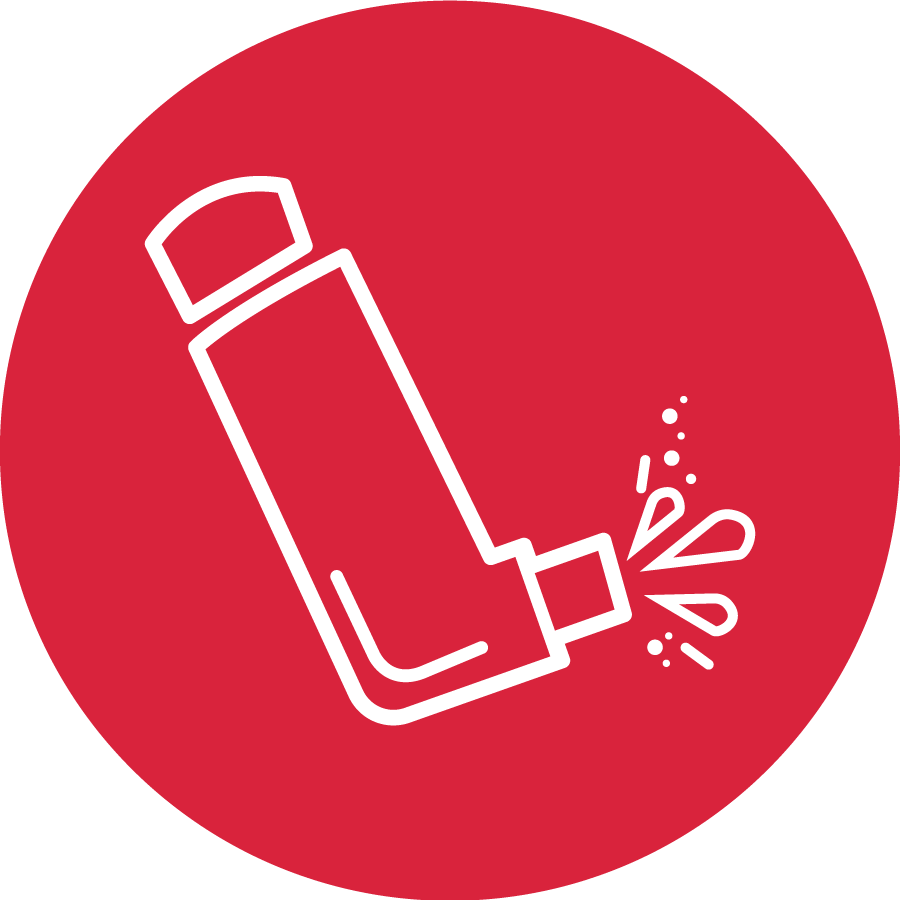Lung Health:
Asthma
Did You Know?
About 1 in 10 New Brunswickers live with asthma, and as many as 1 in 5 children.
Asthma is a chronic lung disease that affects the airways within the lungs.
With asthma, the airways are extra-sensitive to certain triggers that cause the airways to narrow due to swelling of the airway, constriction of the muscles around the airways (bronchoconstriction), or both.
Symptoms can include: wheezing, coughing, chest tightness, and shortness of breath. The symptoms of asthma may happen infrequently or they may be present every day. How severe the symptoms are will be different from person to person and may even change within a person from time to time.
Certain things (triggers) can make your airways become:
-
-
- Swollen and filled with mucus – the swelling and mucus makes your airways narrower, so it is hard for air to pass through.
- Small and tight – your airways might also become twitchy and squeeze together and tighten. This makes your airways narrower and hard for air to pass through.
-
Risk Factors:
While the exact cause of asthma is not known, it appears to result from several factors, including:
-
-
- genetics
- obesity
- the tendency to have allergic reactions
- high exposure to airborne irritants (pet dander, house dust, mould, chemicals, and outdoor air pollution
- exposure to tobacco smoke during pregnancy and childhood
- frequent respiratory infections early in life
indoor and outdoor air quality - low birth weight
- respiratory distress syndrome
-


ASTHMA MANAGEMENT
The first and most important step to gaining control over asthma is to become educated about asthma and how to avoid or minimize exposure to triggers.
Avoiding triggers is the best way to prevent symptoms, but this is not always possible. Controller medications such as inhaled corticosteroids reduce swelling in the airways which makes the airways less sensitive to triggers.
A written asthma action plan (developed by the doctor) and a symptom diary are important tools to catch and treat asthma flare-ups early so they don’t result in a visit to the emergency room.
Download our Asthma Action Plan to help you manage your asthma.
NB Lung has a small number of Inhaler Spacers available for people living with asthma who are in need of a replacement. If the cost of a new spacer is a barrier to you,
reach out to info@nblung.ca with the subject line “spacer”.
Thanks To Our Program Sponsors:

Living With Asthma
When asthma is under control, symptoms such as cough, wheeze, shortness of breath, and chest tightness don’t happen very often. The Canadian Asthma Consensus Guidelines say that well-controlled asthma means:
symptoms during the day happen less than 3 times per week;
symptoms during the night happen less than once a week;
symptoms do not stop a person from being physically active;
flare-ups do not happen often and if they do occur, they are mild;
a reliever medication is not needed more than 3 times a week (doesn’t include using 1 dose/day to prevent symptoms caused by exercise)
using and caring for your asthma inhaler spacer is the best way to make sure you are getting the proper dose of your medication.
Asthma cannot be cured, but symptoms can be controlled by reducing exposure to triggers of airway swelling or bronchoconstriction, and through proper use of medications.
Page Last Updated: 28/02/2023
